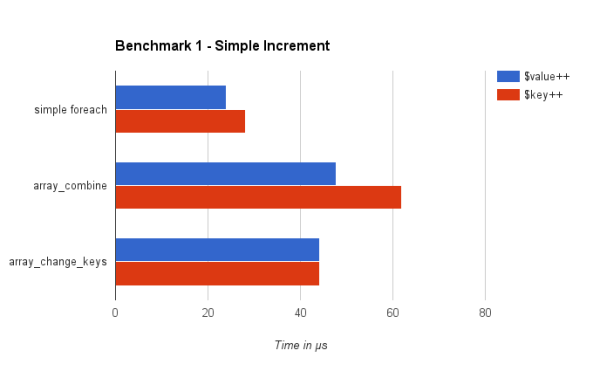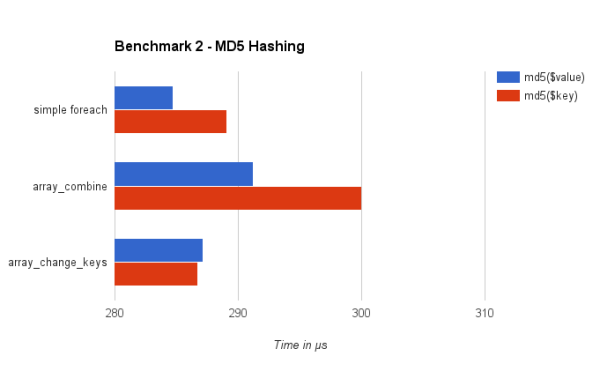PHP RFC: array_change_keys()
- Version: 0.1
- Date: 2016-05-29
- Authors: Colin O'Dell colinodell@gmail.com, Jeremy Mikola jmikola@gmail.com
- Status: Withdrawn
- First Published at: http://wiki.php.net/rfc/array_change_keys
Introduction
This RFC proposes a new core function to simplify the process of changing an array's keys (“re-keying”).
The Problem
PHP only has one existing function to change an array's keys: array_change_key_case(). Unfortunately this can only transform keys to upper- or lower-case.
Because this function doesn't allow developers to specify their own custom logic to transform keys to something else, one must typically resort to using a foreach loop to build a new array:
<?php $newArray = []; foreach ($oldArray as $key => $value) { $newKey = 'someValue'; // Whatever custom logic is needed $newArray[$newKey] = $value; }
This approach requires 4 lines of code. Furthermore, this logic cannot be wrapped as a parameter to some other function.
That latter issue can solved by composing several existing functions like so:
<?php $newArray = array_combine( array_map( function ($key, $value) { return 'someValue'; // Whatever custom logic is needed }, array_keys($oldArray), $oldArray ), $oldArray );
While this does work, it has some major drawbacks:
- The code is convoluted - its purpose is not immediately obvious.
- Requires at least 3 separate function calls, each of which returns a new array.
- The input array is referenced 3 times.
- If you want to re-key an iterator's results, you cannot do so inline - a temporary variable would be needed to convert the iterator to array first.
Proposal
This RFC proposes the creation of a new core function array_change_keys():
$newArray = array_change_keys($originalArray, function ($key, $value) { return 'someValue'; // Whatever custom logic is needed });
Function definition:
array array_change_keys(array $originalArray, callable $callback)
This function takes two arguments:
- An
arrayto re-key. - A
callablewhich returns a new key for each array element.
(This parameter order is consistent with all other array functions except for array_map(), which is a special case due to its variadic nature.)
A new array will be returned from this function, containing the same values in the same order but with potentially different keys. Some values may not be included if an invalid or duplicate key is returned by the callback. This behavior is identical to array_flip() and is documented in the “Callback” subsections further below.
Callback
Two parameters will be passed to the callable for each element in the array:
- The element's original key (
stringorint) - The element's original value (
mixed)
The callable must return a string or int to be used as the new key.
Returning Invalid Types
The callable must return a valid key. Returning any type besides string or int will result in the following warning:
Warning: array_change_keys(): New key should be either a string or an integer
Additionally, the current array item will not be added to the resulting array. PHP will still attempt to process all subsequent elements.
This matches the behavior of calling array_flip on an array containing types other than string or int.
Returning Duplicate Keys
If the callable returns the same key for multiple values, the last occurrence “wins” and all prior values will be lost. For example:
<?php var_dump(array_change_keys([1, 2, 3], function(){ return 'foo'; })); // array(1) { // ["foo"]=> // int(3) // }
This behavior also matches array_flip().
Function Name
PHP already has an array_change_key_case() function, so sharing a common root name (array_change_key) seems like a logical choice.
Other functions which deal with multiple keys (like array_keys and array_fill_keys) are pluralized, so we're using that same convention here.
Discussion
This section will be updated with any additional pros/cons that arise during the discussion period.
Pros
Provides Common General-Purpose Functionality
PHP already has an array_change_key_case function, which is an incredibly specific implementation that isn't useful in the majority of cases where an array needs to be re-keyed. By providing a general-purpose function for a common problem we prevent the need for other array_change_key_* variants in the future.
Usefulness
Needing to re-key array is a common task for some PHP developers, especially those needing their array to work like a dictionary.
Cleaner Code
Using this function makes it immediately obvious to other developers that an array is being re-keyed.
Matches Existing Behavior
The “edge cases” mentioned above (returning invalid types or duplicate keys) matches existing behavior in PHP that developers already understand and expect. No new edge cases or quirks are being introduced with this RFC.
Faster Execution Than array_combine()
Re-keying an array with array_change_keys() is faster than the array_combine approach:
(Benchmarks generated with https://github.com/Ocramius/array_change_keys-benchmark)
Works With Functional Code
This function can be nested inside of other method calls for function composition. The same is not possible for the foreach approach (without requiring the creation of a separate method to encapsulate that functionality).
Cons
Slower Than foreach
As noted in the benchmarks above, the foreach loop approach is faster than array_change_keys in most (but not all) cases.
Does Not Support Traversable
Like the other array_ functions, this one also doesn't support iterators, which may be seen as a step backwards.
Easily Implemented In User Land
This function can be implemented in user land using one of the alternative approaches shown above. There's a general feeling among some developers that “what can be implemented in userland shouldn't be in core”.
Backward Incompatible Changes
None
Proposed PHP Version(s)
Next PHP 7.x release
RFC Impact
To SAPIs
This RFC should not impact the SAPI's.
To Existing Extensions
No existing extensions are affected.
To Opcache
Unknown
Open Issues
None
Future Scope
Other array_ functions do not support certain features like using __toString() for keys or supporting Traversable objects like iterators, so support for them is not being proposed here either. If such functionality is desired, a separate RFC could be created to add this functionality to all similar functions.
Voting
Because this is not a language change, a 50%+1 vote will be required to add this new function.
Patches and Tests
A proposed implementation is provided with this RFC: https://github.com/php/php-src/pull/1925
Several tests are also included.
References
Links to external references, discussions or RFCs
Mailing list discussion: https://marc.info/?l=php-internals&m=146452769326964&w=2
Reddit discussion: https://www.reddit.com/r/PHP/comments/4ll1hg/rfc_array_change_keys/

